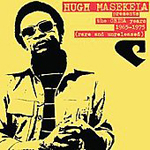|
|
 |
Dusted Reviews
Artist: V/A Album: Hugh Masekela Presents the Chisa Years (1965-1975) Label: BBE Review date: Mar. 19, 2006 |

|
|
|
 |
Ask the typical Dusted reader about Afrobeat, and the first name that comes to mind will be Fela. This would come as no surprise, since the Nigerian artist recorded dozens of albums in a hypnotic, transcendent groove which bore great similarity to the style and motion of James Brown’s pinnacle work – and that so much of his material has been reissued over the years, cited as buzzworthy by artists we idolize, and available almost exclusively in places where more challenging and esoteric music is showcased; where you have to do a little legwork to cover the cost of entry. Not as many would mention Hugh Masekela.
Masekela is best known for the instrumental “Grazing in the Grass,” a charmingly lopsided, cowbell-heavy #1 pop single from 1968 that shouldn’t be unfamiliar to anyone who’s ever been rained out of a baseball game. He’s probably the only musician who can claim credits backing the Byrds, Miriam Makeba, Bob Marley, Paul Simon and Betty Davis, not to mention having played at Monterey Pop. Many of his albums are commonly available in used bins all over the place, and very worth examining, especially the melting-pot scorch of 1966’s The Americanization of Ooga Booga, and a handful of funk- and blues-infused titles on the Blue Thumb label from the early ‘70s. Around the time of the latter, Masekela was embroiled in producing, arranging, and releasing his own music and others on his Chisa imprint, which at the time was nearing its close. For just over a decade, the imprint – first a stamp of production, then a full-fledged label that was bounced between parent companies – released a string of records that brought the sounds of African pop music to the American public, largely unbleached and with stylistic sweetening only added tastefully, and when necessary. Plus, Masekela had a hand in bringing the jazz-funk of the Crusaders out as newly-reformed more-than-jazz artists through Chisa, as well as furthering the career of avant-saxophonist Dudu Pukwana.
Hugh Masekela Presents the Chisa Years is somewhat of a misnomer; this isn’t a label overview, but mostly a clearinghouse of unreleased and long-unavailable tracks from lesser-known Chisa artists Letta Mbulu, the Zulus, and Baranta. Masekela and partner-in-Chisa Stewart Levine produced all the selections here, are credited with songwriting and arranging work, and most likely assembled the studio ensembles that backed these musicians. Miss Mbulu’s energetic vocal presence fronts a dense, brass-intensive studio band ensconsed in moody R&B/funk modes, be they Labelle-esque femme soul strut (“Mahalela”) or ominous, serious swing a la “Melodi (Sounds of Home).” Singing entirely in her native tongue, and with strong male vocal backups, her four selections here offer a righteous counterpoint to the hit-driven soul factories of that day’s Motown, Alston and Invictus/Hot Wax releases. Mbulu was a featured soloist in the Zulus, who offer the most traditional sounds here. A large, percussion-driven vocal ensemble, the group swings and bops through tremendous set pieces of soul-tinged African Gospel music, sounding off with immeasurable joy and booming multi-part harmonies. Extra touches in instrumental embellishment only strengthen their contributions here, like Hawaiian slide guitar spicing up “Aredze” with show-jazz charm. Baranta, with featured vocalist Miatta Fahinbulleh, play in the most traditional Afropop stencils here, earmarked by dense percussion and call-and-response vocal parts, with the expected concessions to then-modern music, like the psych-fuzz guitar burns on “A Cheeka Laka Laka.” Masekela himself drops in on album opener “Afro Beat Blues,” his backing band Ojah in tow, a seriously funky seven minutes spent slipping into darkness about the trials and tribulations of the touring musician, with a down, martial rhythm, wicked guitar work and a hot, memorable hook.
World music is often defined as a combination of ethnic influences with Western embellishments. More often than not, this spells out weak, safe, Putumayo-esque Starbucks coaster music for moms in SUVs who want to feel more in touch with foreign cultures. Masekela never played that game; nor did the acts he worked with. The cuts assembled here will do nothing more than put the itch in you to seek out and discover more music just like it, world music that encompasses everything it sees, doesn’t glaze over its homeland's sounds, and gets your ass moving in the process.
By Doug Mosurock
|







